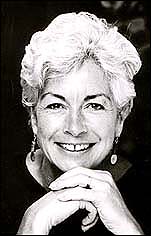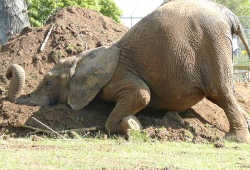Dorothy – 2/2/01
|
|
| Scilla Elworthy |
Scilla Elworthy who comes from the United Kingdom is Director of the Oxford Research Group which she founded in 1982 – a group committed to working for peace and aiming first to find out how nuclear decisions are made and who makes them. She now travels widely bringing together those who work on nuclear weapons and their critics. She is a consultant to UNESCO and has twice been nominated for the Nobel Peace Prize. She has a doctorate in political science and is in demand for television appearances and as a lecturer in many countries around the world.
Why is Scilla in New Zealand? Scilla talked to me about what she called ‘the New Zealand factor’ . New Zealand’s nuclear free stance and the challenge issued to the United States has sent ripples far wider than just the communication between these two nations. The action of a country with a small population taking a stand against the might of NATO has sent a strong message of encouragement to other seemingly powerless countries. Scilla wanted to see this country for herself and to spend some time with the leaders of the New Zealand peace movement who continue to work for the abolition of nuclear weapons. Through the World Court Project, Abolition 2000 and the Middle Powers Initiative she has already worked with Kate Dewes and Rob Green of the Peace Foundation’s Disarmament Centre in Christchurch.
Scilla writes about the importance of recharging, so that we do not ‘burn ourselves out’ through unremitting work. Her time in New Zealand is a time of recharging.
Scilla Elworthy’s book Power and Sex I was so impressed by Scilla’s uncontrived power that I felt I must read her book, Power and Sex and having read it I want to share with NZine readers some of what seemed to me the most memorable ideas in the book.
What led Scilla to write the book Power and Sex? At a millennial point in history Scilla felt moved to write this book which focuses on the importance of the way people perceive themselves. She has been working with people of enormous power worldwide – people who make decisions about nuclear issues and she has been getting through barriers.
Power and Sex was published in 1996, but I had not come across it until I talked with Scilla. Had I known nothing about the author I would have expected the book to give advice to women about how to use their sexuality to gain dominance, but how wrong I would have been. Her message is quite different.
I have seen the book described as ‘a book for women’. I would disagree with this description, as I see it as a book for everyone. That does not mean that everyone will take the time to read it. It is an in-depth exploration of power in its many forms and an evaluation of the true power which can benefit the individual and the world. It is a long book requiring concentration from the reader. Though I am putting some comments about the book in this article I know that to gain full benefit from it I will need to read it again.
Why did Scilla undertake research into the meaning of power? Scilla begins by explaining that she wants to know how to be powerful in a way which enables her to respond effectively when she sees power being abused, and yet not use her own power abusively.
Her research aimed to find answers to the following questions:
- Is there such a thing as benign power?
- Is there a kind of integrity immune to the corruptions of power?
- What is the relationship between power and responsibility?
- Can the human values of the private sphere be used in international relations?
- Hw can conflicts be prevented?
In presenting the results of her research Scilla begins by discussing what she terms ‘domination power’ which includes manipulation and control as well as physical force. There is also what Kenneth Boulding calls integrative power – the power of love, not linked to military or economic power.
Women lose their early power and are repressed In the first part of the book Scilla describes the role of women in goddess-worshipping societies where they had equality with men. That seems to have been an era celebrating sexuality and creativity, but subsequently the Garden of Eden myth changed all that. Since then women have been made to feel guilty about sexuality, view menstruation as a curse, and fear old age as a time of rejection rather than respect. Women have been subjected into powerlessness, and the height of degradation is the genital mutilation practised in many countries to repress female sexuality – what amounts to the torture of young girls.
Genital mutilation Scilla writes of genital mutilation with authority as in 1978 she was commissioned by Minority Rights Group to research this practice and in 1980 produced a report which resulted in widespread media coverage and international pressure for the practice to be stopped.
Women with Power From the chapter ‘Women without Power’ the book moves to a discussion of ‘Women with Power’. Being able to do the same things as men is viewed as power by many women who are looking only at military or economic power. Others seek power through sexual attractiveness or their roles as mothers, but this is ‘power over’ and is unlikely to last.
Developing inner power In part II of the book Scilla gives some guidelines on developing ‘inner power’. First she deals with power arising from self-knowledge. This power aids understanding of others, can give personal power rather than position power, improved communication and freedom from guilt and blaming.
Our understanding of situations improves. "When we know ourselves, we are more able to see what is actually happening around us, as distinct from what we think is happening when we are disorientated by the fog of our own fears, hopes, prejudices, projections and expectations".
Power from within the Body This section covers sex and power and liberation from sexual guilt, and changed attitudes to menstruation, menopause and death. Where lovemaking is a genuine expression of love rather than just sexual gratification both women and men are empowered by the relationship.
Scilla stresses the need to acknowledge menstruation rather than to try to hide and ignore periods as suggested by advertisements for tampons. She also cast what was for me new light on the menopause by suggesting that the timing of hot flushes often related to times of stress and feelings of inadequacy and highlighted the need to get free of these negative emotions.
Power from within the Soul In this chapter Scilla writes not about religion or the occult, but about meditation and the development of spirituality and creativity to bring about change.
Inner Power and Union Discussion on this topic includes an account of the seven chakras, the seven basic energy centres defined in Chinese theory, to show both how body, mind and soul can work together and how power and sex can work together.
Power in the Great Mysterious This chapter touches on the way that the power of nature can help develop our inner power, for some people through working with shamans, for others through nature festivals, for others through yoga or tai ch’i, surrendering to the power of nature, to the grace of the universe.
Given this inner power how can we best use it? Techniques for dealing with a bully without becoming a thug are covered in the next chapter and then the focus widens to ‘Power and World Conflict’. Examples of non-violent direct action include the women at Greenham Common and the women who disrobed to oppose the building of a dam in the Philippines.
The foundation of the Oxford Research Group Scilla explained to me how a new awareness began for her in 1982 during the Special Second Session on Disarmament at the United Nations in New York. She was deeply moved and inspired by a genuine peace demonstration where a million people from all over the world gathered in Central Park to demonstrate for nuclear disarmament, but no one among those with power was influenced to make any change.
She was strap hanging on a tram in New York when she thought, "Who makes the real decisions about nuclear issues?" She was moved to take action and used her savings to set up a research group to investigate the Who’s Who of Decision Making and to train people to communicate non-violently with decision-makers.
It took years of research to find out who were the key people making decisions about nuclear arms and their use. The UK Ministry of Defence banned contact with the group, but they found ways to contact people in power.
Citizens involved Scilla describes in the book how groups of citizens who were concerned about nuclear issues were given information and enabled to communicate with someone in power – someone remote, busy and seen as threatening. Being involved in this programme counteracted their despair about the arms race and people’s confidence grew as they became well informed on the topics which they were asked to investigate.
For success in this type of communication the means must be the same as the end. The methods must be true to the goal, and the people wanting change have to be patient as it often requires persistence to achieve results. Being well-informed and using the strengths of others to work as groups are keys to success.
The final chapter How Inner Personal Power works for men and women The need to move away from present destructive power is paramount. In the new concept of power the concept of original health replaces the concept of original sin. We view neighbours with ‘unconditional positive regard’. Care and love are more powerful than aggression.
"A man with inner power wants to know the patterns of the world, to understand himself and to experience his connection with the eternal… He lives and works with women on the basis of equality and respect."
The woman with inner power "has learned to rely on the messages of her body and the knowledge of herself… People feel safe with her because she has her feet planted within the earth… She becomes wiser as she gets older, and becomes more essential to her community, not less."
Scilla’s frank sharing of experiences This is an honest book in which Scilla shares her own experiences and does not hide the difficulties she has experienced. That quality increased my interest in the book and my desire to work for the power from within.
Back to Scilla in New Zealand A visit to New Zealand as a Pacific nation has special significance for her as she believes that the peoples of the Pacific have the key to the future because of their traditions of non-violence and open channels of communication.
She has been greatly impressed by ho’oponnoponno the Hawaiian tradition which decrees that a family will not sleep until all its issues are settled. On a broader scale this principle could be developed to communicate across great gulfs of potential misunderstanding.
Reversing insularity In the work of her organisation what Scilla sees as most important is that they are reversing insularity by organising meetings where individual nuclear policy makers meet their critics. Nuclear scientists find themselves looking at the human aspect of their work – the suffering involved in nuclear warfare.
Facilitating listening People like Rob Green, former Navy Commander, and Frank Barnaby, former nuclear warhead physicist, have sufficient knowledge to be respected by nuclear policy makers.
Gatherings informal and totally off record People attending the gatherings are assured that the discussions are totally off record and confidential, and after eight years the group’s reputation for keeping their word that there will be no leaks has increased the atmosphere of trust. This means that people really talk, and break through any antagonism.
Interest in the meetings spreads by word of mouth. They are in marked contrast to the usual conferences attended by powerful decision makers. They are not held in luxurious surroundings. Participants have to make their own beds. Members of the group organising the meeting prepare the meals.
Body work is offered to reduce the impact of jet lag. Supporters of the programme meditate in a room below the discussions to maintain the flow of energy within the room.
People who have attended a meeting often return for further discussions. The reputation of the gatherings spreads, as Scilla put it, "by positive
contamination".
What can New Zealand contribute? Scilla is impressed by the New Zealand type of communication. She believes that New Zealanders can do much to contribute to the thaw because of the accessibility of people in government, their informality and directness. The cross-fertilisation between New Zealand’s NGOs and Government can provide a model for the future, as exemplified by people like Kate Dewes, Coordinator of the Peace Foundation’s Disarmament and Security Centre.
Aotearoa/New Zealand has also showed the world how a small nation can stand up to powerful superpowers on an issue of principle – the need to abolish nuclear weapons.
Power and Sex was first published in Great Britain in 1996 by Element Books Ltd, and subsequently in the USA and Australia.





